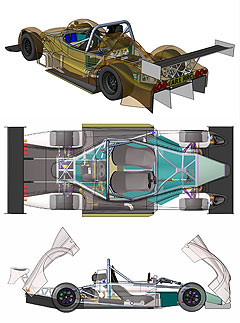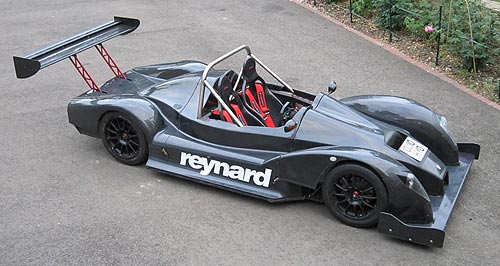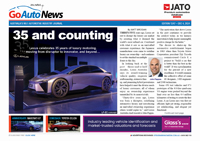Make / Model Search
Future models - Reynard - InverterUpside-down sports car now road-legal in UKWinged warrior: The British Reynard Inverter will come with a choice of powertrains. Reynard’s 3g Inverter road racer gets the tick for limited road release16 Aug 2010 THE Reynard Inverter sports car, so-called because it produces enough downforce at 160km/h to theoretically drive upside-down on the ceiling of a tunnel, has passed the British Individual Vehicle Assessment (IVA) to make it road-legal. A brainchild of race car constructor Dr Adrian Reynard and race engineer Andre Brown, the 445kg Inverter is claimed to be capable of producing 1180kg of downforce and sustaining more than 3g in corners on road tyres. In the UK, a track-ready Inverter powered by a 132kW 1000cc Honda Fireblade engine and with a top speed of 217km/h can be had for £35,000 ($61,000). A 147kW, 1340cc Suzuki Hayabusa engine is also available, with further versions powered by car engines and even an EV under development. A franchise system is being considered to enable third parties to manufacture the cars internationally.  One of the aims of the Inverter project is to become a “virtual car company” with manufacture and assembly of the vehicles outsourced so that the company can focus on design and development. One of the aims of the Inverter project is to become a “virtual car company” with manufacture and assembly of the vehicles outsourced so that the company can focus on design and development.To challenge the high cost of entry to one-make race series and taking inspiration from the open source software movement, Andre (the name of Brown’s company, which is promoting the Inverter) also plans to make the Inverter’s engineering plans publicly available and encourage the racing community to develop and manufacture its own components and upgrades for the car. The company is also lobbying for the introduction of a new ‘Innovation’ race category in which more technical freedom is allowed in return for a yearly five per cent reduction in fuel tank capacity. The UK’s IVA system enables small manufacturers, kit-car builders and vehicle importers to register individual cars for the road, providing they meet basic criteria. Caterham cars, which has been importing ADR-compliant Lotus Seven replicas into Australia since 2006, bases its Australian-bound cars on European Type Approved models because British IVA approved cars are not eligible for Australian Design Rule compliance. The road-going Inverter’s suspension is based on that of the Lotus Elise, and its steering column comes from the humble Ford Ka. It is available with a choice of fibreglass or carbon-fibre bodywork, depending on the customer’s budget. The first Inverters will be sold as a rolling chassis and body, costing £14,900 ($26,000) with the price of the fully-built car depending on its final specification. Significantly, the company’s brochure also includes the description of a 145kW Inverter EV with a 240km road range, dropping to under 50km under race conditions. Dr Adrian Reynard built his first racing car in 1973 as a student. In 1979, he drove cars of his own design to win the European and British Formula Ford 2000 championships. The race car designer and builder went on to become a founder of the BAR Formula 1 team. To this day, he continues to provide consultancy and test facilities to motorsport. Andre Brown, who met Mr Reynard through the Motorsport Industry Association, has an Engineering degree from Bath University and founded his own company, Hartham, for the purpose of race car design and development. Mr Reynard’s interest in low-cost manufacturing and a desire to produce a road car led him to team up with Brown to design a road-legal sports car capable of competing in the 750MC Bikesports championship that would be easy to construct using automated, computerised and robotic techniques.  All future models Alfa Romeo Alfa Romeo Abarth Abarth Alpine Alpine Alpina Alpina Audi Audi Aston Martin Aston Martin BMW BMW Bentley Bentley Chery Chery Brabham Brabham Chrysler Chrysler Chevrolet Chevrolet Cupra Cupra Citroen Citroen DS DS Dodge Dodge Fiat Fiat Ferrari Ferrari Foton Foton Ford Ford Great Wall Great Wall FPV FPV Haval Haval GWM GWM Honda Honda Holden Holden Hummer Hummer HSV HSV Infiniti Infiniti Hyundai Hyundai Jaguar Jaguar Isuzu Isuzu Kia Kia Jeep Jeep Land Rover Land Rover Lamborghini Lamborghini Lexus Lexus LDV LDV Mahindra Mahindra Lotus Lotus Mazda Mazda Maserati Maserati Mercedes-AMG Mercedes-AMG McLaren McLaren MG MG Mercedes-Benz Mercedes-Benz Mitsubishi Mitsubishi Mini Mini Opel Opel Nissan Nissan Peugeot Peugeot Pagani Pagani Proton Proton Porsche Porsche Renault Renault Ram Ram Rover Rover Rolls-Royce Rolls-Royce Skoda Skoda Saab Saab SsangYong SsangYong Smart Smart Suzuki Suzuki Subaru Subaru Toyota Toyota Tesla Tesla Volvo VolvoMotor industry news |
Click to shareReynard modelsAll future models Alfa Romeo Alfa Romeo Abarth Abarth Alpine Alpine Alpina Alpina Audi Audi Aston Martin Aston Martin BMW BMW Bentley Bentley Chery Chery Brabham Brabham Chrysler Chrysler Chevrolet Chevrolet Cupra Cupra Citroen Citroen DS DS Dodge Dodge Fiat Fiat Ferrari Ferrari Foton Foton Ford Ford Great Wall Great Wall FPV FPV Haval Haval GWM GWM Honda Honda Holden Holden Hummer Hummer HSV HSV Infiniti Infiniti Hyundai Hyundai Jaguar Jaguar Isuzu Isuzu Kia Kia Jeep Jeep Land Rover Land Rover Lamborghini Lamborghini Lexus Lexus LDV LDV Mahindra Mahindra Lotus Lotus Mazda Mazda Maserati Maserati Mercedes-AMG Mercedes-AMG McLaren McLaren MG MG Mercedes-Benz Mercedes-Benz Mitsubishi Mitsubishi Mini Mini Opel Opel Nissan Nissan Peugeot Peugeot Pagani Pagani Proton Proton Porsche Porsche Renault Renault Ram Ram Rover Rover Rolls-Royce Rolls-Royce Skoda Skoda Saab Saab SsangYong SsangYong Smart Smart Suzuki Suzuki Subaru Subaru Toyota Toyota Tesla Tesla Volvo VolvoMotor industry news |









Facebook Twitter Instagram